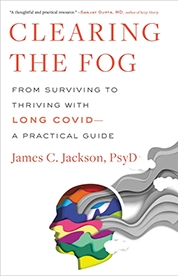Brain Fog or Brain Injury? Understanding Cognitive Impairment in Long Covid
Cognitive impairment is a key challenge for patients with Long Covid, impacting as many as 200 million people around the world. Drawing on relevant research and his own clinical experience, Dr. Jackson describes state-of-the-art findings and compelling case studies that highlight what cognitive impairment after Covid “is” and what it “is not.” This lecture will help attendees understand how cognitive impairment develops, what aspects of cognition it affects, its effect on work and relationships, and how it can be treated, relying on insights from the science of neuroplasticity and from rehabilitation.
Understanding Long Covid
It’s estimated that more than 130 million people around the world suffer from Long Covid, more than five times the number of people who live in New York City. In this lecture, Dr. Jackson will explain what Long Covid is, explain theories pertaining to how it develops, and offer research and clinically based insights on how to treat it. Drawing from his experience working with “Long Haulers” and from decades of work with medical patients experiencing chronic illnesses, he explains key issues related to Long Covid, with a specific emphasis on cognition, mental health, and family support and on helping patients and families “thrive” and not merely “survive.”
An Unexpected Positive: Post Traumatic Growth in the Age of Long Covid
The pandemic has been stressful and even traumatic. While trauma can affect us negatively and even cause PTSD, it can also be a gateway to new ways of living more positively by fostering closer relationships, increasing our sense of gratitude, and helping us forge a deeper sense of purpose. Positive changes that develop after trauma can lead to what psychologists call “Post Traumatic Growth” or PTG. Drawing on his own clinical experience, Dr. Jackson introduces key concepts related to PTG, highlighting the ways that Covid-related trauma can lead to PTG, and describes how to foster PTG in individuals, organizations, and cultures.
Trauma and Long Covid: Creating a Culture of Trauma Informed Care
Many patients with Long Covid have PTSD and many more report experiencing symptoms of trauma, even if they don’t meet the criteria for a formal PTSD diagnosis. Healthcare providers must engage Long Covid patients using the principles of trauma-informed care – including how trauma impacts people and groups, learning to recognize the signs of trauma, developing systems that can respond to trauma, and avoiding re-traumatization. In this talk, Dr. Jackson offers practical strategies for integrating trauma-informed principles and developing trauma-informed mindsets to better meet the needs of patients with Covid as well as Covid survivors.
The Only Way Around is Through: The Value of Leaning into Hard Things
As a result of a brief illness that occurred two years before the pandemic, Dr. Jackson developed severe obsessive-compulsive disorder. Its rapid and unexpected emergence upended every aspect of his life and led him on a journey of healing and transformation. By relying on the principles of Acceptance and Commitment Therapy (ACT), he found relief in the realization that the way to conquer hard things was through acceptance. In this intimate talk, Dr. Jackson describes his journey from doctor to patient, and how his experience with OCD enabled him to boldly face lifelong fears and transform him into a better person and a more empathic doctor and researcher.





